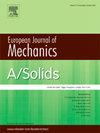用夹层板堆叠的三维超材料中的拓扑弹性波传输与操纵
IF 4.4
2区 工程技术
Q1 MECHANICS
引用次数: 0
摘要
拓扑超材料表现出前所未有的波操纵能力,具有拓扑保护的鲁棒性,在一维(1D)和二维(2D)机械系统中已得到广泛研究,但在三维(3D)系统中探索较少。本研究提出了一种具有周期性堆叠三明治超材料板的三维拓扑机械超材料,可在相对较低的频率范围内实现二维拓扑表面波传输。在三明治超材料板上采用了创新的手性压缩-扭转耦合核心,以降低带频。类似于量子谷霍尔效应,通过打破空间反转对称性来抬高两倍拓扑节点线,从而打开拓扑带隙。通过超胞分析,拓扑界面态被证明出现在两个拓扑不同的域的界面上,拓扑边界态也可以在适当的自由或固定边界条件下被激发。利用三维周期性,研究了基于拓扑界面态和边界态的波在二维平板和三维结构中的传播,分别实现了一维拓扑波导和二维拓扑表面波传输。研究发现,模式对称性匹配对于构建具有界面态和边界态的拓扑波传输至关重要。利用边界态对边界条件的依赖性,该研究创新性地提出了无需复杂结构设计、通过控制边界条件即可实现路由切换和层选择的波操纵,丰富了可调弹性波操纵的策略。此外,通过引入缺陷和紊乱,还证明了拓扑保护的表面波传输。这些发现为研究三维机械超材料中弹性波的拓扑传输提供了新的视角,有助于开发用于减震、能量收集和信号传感等各种用途的智能而坚固的设备。本文章由计算机程序翻译,如有差异,请以英文原文为准。
Topological elastic wave transport and manipulation in three-dimensional metamaterials stacked with sandwich plates
Topological metamaterials demonstrate unprecedented wave manipulation abilities with topologically protected robustness, which have been extensively investigated in one-dimensional (1D) and two-dimensional (2D) mechanical systems, but less explored in three-dimensional (3D) systems. In this study, a 3D topological mechanical metamaterial with periodically stacked sandwich metamaterial plates is proposed to achieve 2D topological surface wave transport in a relatively low-frequency range. An innovative chiral compression-torsion coupling core is employed on the sandwich metamaterial plate to lower the band frequency. Analogous to the quantum valley Hall effect, the two-fold topological nodal line is lifted by breaking the spatial inversion symmetry, opening a topological band gap. By supercell analysis, the topological interface state is demonstrated to appear at the interface of two topologically different domains, and the topological boundary state can also be excited under appropriate free or fixed boundary conditions. Taking advantage of the 3D periodicity, the wave propagation based on both topological interface states and boundary states is examined in both 2D flat plates and 3D structures, realizing 1D topological waveguide and 2D topological surface wave transport respectively. It is found that mode symmetry matching is crucial for constructing the topological wave transport with both interface and boundary states. Leveraging the dependence of boundary states on boundary conditions, this work innovatively presents route-switchable and layer-selective wave manipulation by controlling boundary conditions without complicated structure design, enriching the strategies for tunable elastic wave manipulation. Besides, the topologically protected surface wave transport is demonstrated by introducing defects and disorders. These findings provide new insights into the topological transport of elastic waves in 3D mechanical metamaterials and contribute to the development of intelligent and robust devices for various purposes, such as vibration mitigation, energy harvesting, and signal sensing.
求助全文
通过发布文献求助,成功后即可免费获取论文全文。
去求助
来源期刊
CiteScore
7.00
自引率
7.30%
发文量
275
审稿时长
48 days
期刊介绍:
The European Journal of Mechanics endash; A/Solids continues to publish articles in English in all areas of Solid Mechanics from the physical and mathematical basis to materials engineering, technological applications and methods of modern computational mechanics, both pure and applied research.

 求助内容:
求助内容: 应助结果提醒方式:
应助结果提醒方式:


